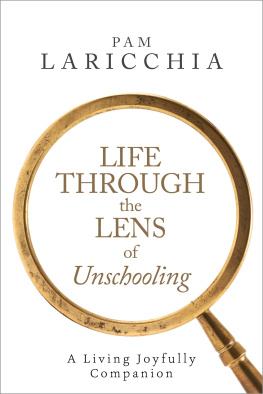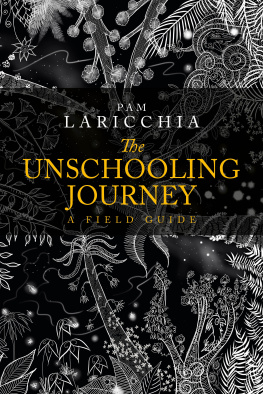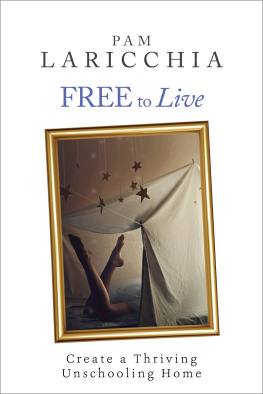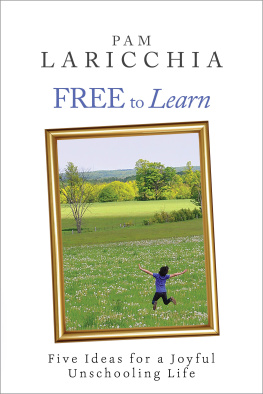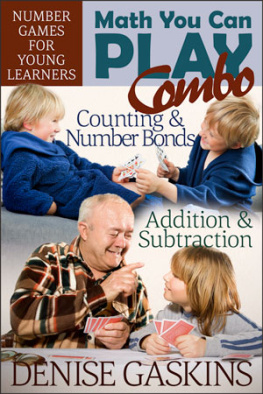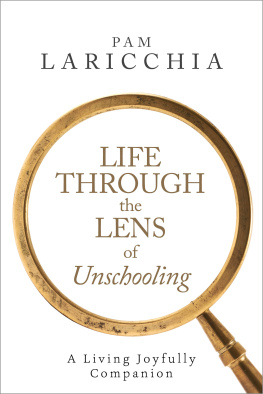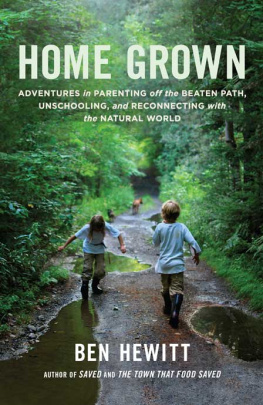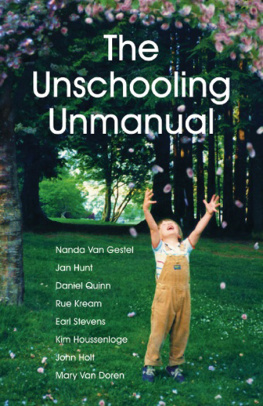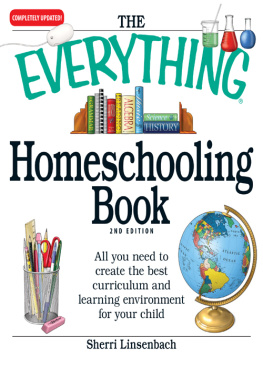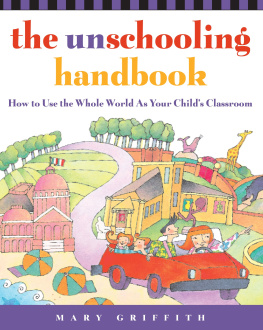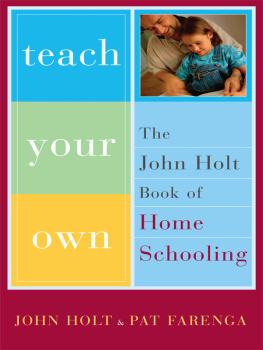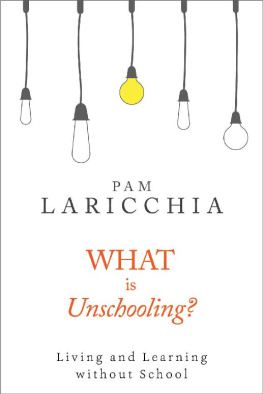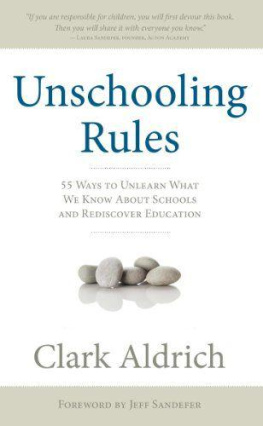Contents
Life Through the Lens of Unschooling
A Living Joyfully Companion
PAM LARICCHIA
Copyright 2014 Pam Laricchia
All rights reserved.
Published by
Living Joyfully Enterprises
Erin, Ontario, Canada
ISBN: 978-0-9877333-6-8
Edited by Alexandra Peace.
Cover design by Jane Dixon-Smith.
Ones mind, once stretched by a new idea, never regains its original dimensions.
Oliver Wendall Holmes, Sr.
introduction
When I first started blogging regularly about unschooling in the fall of 2012, it was a place for me to have some fun. I had one book published at that point, Free to Learn: Five Ideas for a Joyful Unschooling Life , which I had written with an eye to being concise, accessible, and as helpful as possible for people trying to understand the principles behind unschooling. The blog was, and is, a place I could share more about the day-to-day antics of living with unschooling. Share some personal experiences. What does life look like for an unschooling family? And I could ask myself questions and play with the answers in short bursts, without the need to form a larger narrative.
Now were in early 2014 and the Living Joyfully with Unschooling blog has over sixty posts of varying length, covering a wide array of topics that look at life through the lens of unschooling. Yet the chronological nature of an online blog means that, for the reader, its easy to find the most recent posts, but even with categorizing and tagging, digging through the inventory to find the particular posts that would be most helpful to them at this particular moment of their unschooling journey is challenging.
I began to think about the value of bringing together all this writing in a more manageable format. Yet I also didnt want to just create a blog in a book form. The chronological nature of the writing is now irrelevant. And the posts are already categorized by monthly topic on the blog, so thats taken care of. How might I bring this project together so that it has greater value for the reader?
So I created a swirling pot of all the posts. I stirred and peeked and stirred some more. I played with numerous ways to organize and group them, looking for ways that might bring additional clarity beyond the posts themselves. Eventually I hit upon the single words you see in the table of contents. These are words that, since we began unschooling in 2002, have been woven into the fabric of my understanding of unschooling. And as I sorted and re-sorted my blog posts into these threads, some wonderful synergies emerged.
You may find some content overlap, yet each time its within a different context. I specifically chose to keep that because I dont know which context will make sense for which readers. Thats how learning worksdifferent connections for different people.
Gathering my blog writing into book form also gave me the perfect excuse to work with my lovely editor again! Typos were caught, thoughts clarified, grammar tightened. All very good things.
Why call it a companion?
Ive chosen to call it a companion book because its not meant to explain the ABCs of unschooling. It doesnt march from beginning to end, illuminating different aspects of a single theme. It meanders here and there, diving into the thoughts and questions I have pondered on the blog up to this point in time. The theme is life; the lensunschooling. I imagine it accompanying you, a joyful companion on your unschooling journey, as you dig deeper into your understanding of unschooling and what it might look like day-to-day in your family.
Speaking of which, it neednt be read in order. If youre wondering about something in particular, skim through the table of contents. Which word seems most closely related? Which post seems like it might stretch your thinking, or spark new insights?
Thank you for inviting me along on your unschooling journey!
:: deschooling ::
Some ideas to consider as you begin your journey to unschooling.
Why Deschooling?
Deschooling is a general term used to describe the transition period as we shift from school or school-at-home to unschooling. For children, its about rediscovering life outside the walls of the classroom, and the confines of a daily schedule dictated by the clock. For parents, its a time when we explore and expand our definition of learning beyond the classroom paradigm. Conventional wisdom has told us that learning looks like teachers and listening and writing and tests. And even years after weve graduated, chances are our vision of learning is still locked within those four walls. But what might we see if we remove our school goggles?
The guideline surrounding deschooling is that the process typically takes about one month per year of school or school-at-home. Right away that tells us that parents will likely have the bulk of the work to dowhich makes sense because weve been enmeshed in school culture the longest. Really, it takes as long as it takes, but where the statement really helps is planting the idea that the process takes a while. Not a few weeks or a couple months, but some real time. Long enough that when youre nearing the end, hopefully youve reached the point where youre not even looking for the end any more.
Thats a great point to remember when you find yourself feeling overwhelmed with information and begin to worry: deschooling is going to take months and months. And months. I recall posting on a homeschooling forum about six weeks after my children left school about my worry that, at least my older two (ages 10 and 8 at the time), just wanted to play all the time. I was encouraged to relax and I think someone mentioned the longer time line of deschooling at that point. I relaxed and six months or so down the road I looked back at that post and laughed, realizing how tightly I had been clinging to my school gogglesI wasnt yet seeing all the learning that was happening in their play.
Moving to unschooling is a process. Six weeks can seem like a long time when you feel like youve leaped into the unknown, but in the grand scheme of things, its just a blip on the radar. If you find yourself questioning your choices, thats good! Its part of the process. Do your best to answer your questions; dont just throw up your hands in defeat. And yet be careful not to use the longer-term nature of deschooling as an excuse to dilly-dally: take another step forward, and another. Keep learning and observing and thinking. You cant change past moments, but right here, right now, is a new moment in which you get to choose how to act and react.
For me, it was probably about a year before I felt like we were truly unschooling, not deschooling. There was no announcement, no graduation ceremony, but one day I realized I no longer felt like I was emulating the lifestylewe were living it. I was no longer trying to wrap my mind around the principles; instead I was spending my time supporting how those principles were playing out in my unique family.
So how do you get there?
Something spurred you to investigate unschooling and whatever it was, thats a great place to start because thats where unschooling has made a connection with you. What conventional idea were you questioning? What unschooling action or principle caught your attention in response? Why? If you stay with the conventional wisdom, how might it play out in your family over the next five years? What about the unschooling perspective? What might that look like in your family today? In a year? In five years?
Alongside that, since unschooling is about creating an environment for learning to replace school, ask yourself tons of questions to explore your understanding of learning. Youve been learning for many years, so hows that been working for you? How would you define real learning? What does a test really measure? How much of what you learned in school do you still remember? Whats the difference between what you remember and what you dont? Do you better remember the stuff that was useful to you? Interesting to you? Have you learned things on your own since leaving school? What about hobbies? Is that learning any less valuable just because it was done outside a classroom? Is there a difference in how easily you learned things you were told to learn and things you wanted to learn?

